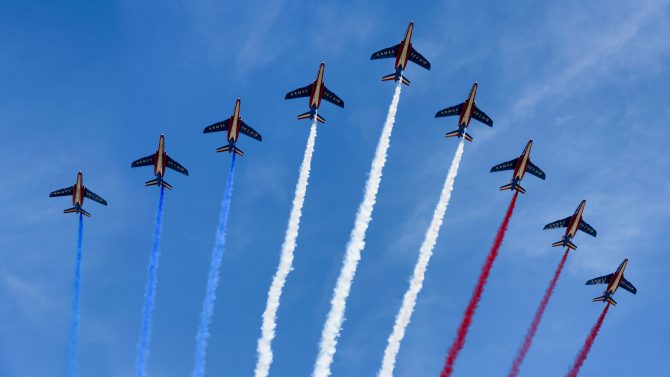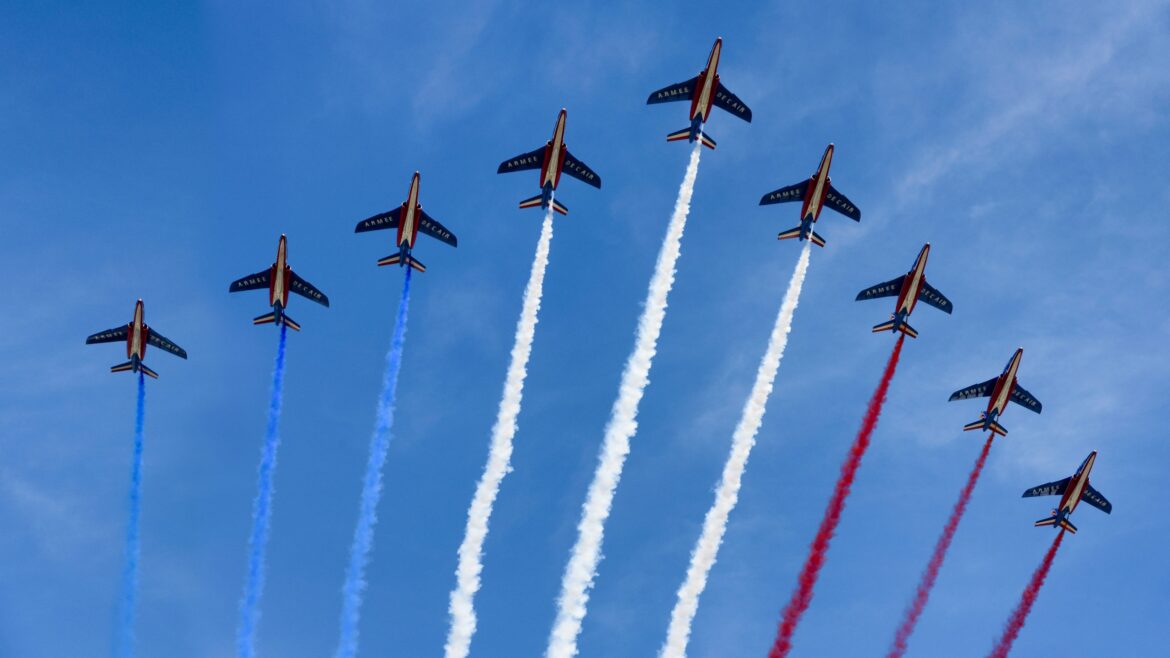La Fête Nationale: How Bastille Day Is Celebrated Around France – FrenchEntrée
La Fête Nationale: How Bastille Day Is Celebrated Around France – FrenchEntrée
Feature


Bastille Day (or “La Fête Nationale,” as it’s known in France) is a national holiday to celebrate the storming of the Bastille, the event that kickstarted the French Revolution on July 14th 1789. A day brimming with National Pride or a chance to take a long weekend and spend time with family and friends?
How is La Fête Nationale celebrated?
It is a public holiday, so many people take a mini break away for the long weekend. We welcomed families at our gîtes here for the long weekend. And that seems to be more the trend than an outpouring of National Pride – it’s really about family time.
Fireworks (Feux d’artifice): Lots of towns, villages and cities will have a fireworks display, usually on the evening of July 14th, or sometimes on the 13th in smaller communities. In Rouillac, here in the Charente, families gather with picnic blankets to enjoy the show. This year, however, the event has been put back due to fears of wildfires.
Bal des Pompiers (Firemen’s Balls): These are incredibly popular across France, often held on the evening of July 13th. Fire stations open their doors for public dances, music, food, and drinks. In Rouillac, there was a huge Pompiers disco with free entry.
Local Parades (Défilés): While the grand military parade is in Paris, most towns and cities will have smaller, local parades. Although in our part of the Charente, this is less in evidence.
Communal Meals and Picnics: Many families will gather for special meals, either at home, in restaurants offering special “14 juillet” menus, or with picnics in parks or along riverbanks. Here in Aigre, there was a big community meal in the Parc des Charmilles.
“Bleu, Blanc, Rouge “: You’ll see a little more of the French tricolour with flags hanging from windows and decorations in public spaces.
Regional Differences for Families:
Paris and Île-de-France
The Grand Spectacle: For families who want to experience the biggest and most formal celebration, Paris is the place. The morning military parade on the Champs-Élysées is a massive event with military personnel, vehicles, and air force flyovers.
Eiffel Tower Fireworks: The evening fireworks display over the Eiffel Tower, usually accompanied by a classical music concert on the Champ de Mars, is world-famous.
Bals des Pompiers: Parisian fire stations host some of the largest and most famous fire-fighters’ balls.
Free Museum Entry: Some major museums in Paris occasionally offer free entry on Bastille Day, which can be a great family activity earlier in the day.
Provence-Alpes-Côte d’Azur (Southeast, Mediterranean Coast)
Marseille’s Vieux-Port: In Marseille, the fireworks over the Old Port are spectacular, with families gathering along the waterfront and in café terraces.
Provençal Folk Dances: In smaller towns or villages, particularly in rural Provence, you might find more traditional Provençal folk dances and music.
Market Atmosphere: Local markets often have a festive atmosphere, selling regional produce for picnics.
Brittany
Celtic Influence: While Bastille Day is a national holiday, in Brittany, there are traditional celebrations mixed with Breton culture. You might find Breton music (bagpipes, bombardes) or traditional Breton dances too.
Coastal Celebrations: Along the coast, fireworks displays are often seen over the sea.
Alsace (Northeast, German Border)
Franco-German Blend: Alsace has a strong German influence, so food and celebrations reflect that.
Local “Fêtes”: Smaller villages have smaller “fêtes” with traditional Alsatian food and drink.
Strasbourg’s Canals: In Strasbourg, there is an area called La Petite France, which is characterised by canals and quaint bridges alongside les maisons à colombages (Tudor-looking houses with the wooden beams exposed on the outside). The fireworks are here against this beautiful backdrop.
Nouvelle-Aquitaine (Southwest, Atlantic Coast)
Bordeaux’s Waterfront: These celebrations include a large picnic at Parc Simone Signoret on the 13th, followed by military parades and fireworks over the Garonne River on the 14th. Families gather along the riverbanks.
Carcassonne’s Citadel: One of France’s most renowned fireworks displays is held at the medieval citadel of Carcassonne.
Pétanque: Many families get together for picnics and a game of bowls.
In our own town of Aigre 16140 this year, there is a parade of Fire Engines in the streets, followed by a ‘Repas Champêtre in the park to the backdrop of live music. Rouillac hosts an annual fireworks display and many towns organise community meals.
Auvergne-Rhône-Alpes (Central-East, Mountains)
Lyon’s Hilltop Fireworks: There are also balls and gatherings along the banks of the Saône River.
Summer Festivals: Bastille Day often coincides with various summer festivals (“Tout L’Monde Dehors” in Lyon, for example)- family-friendly entertainment such as open-air music, theatre, and dance.
From my experience, Liberté, Égalité, Fraternité” on the “Le Quatorze Juillet” is most definitely about spending time with family and friends.
Share to:
Twitter
LinkedIn
Previous Article
News Digest: Eurostar Expansion, Wildfires & Is the Water at Your French Home PFAS free?
Next Article
BoE Stays Cautious & Euro Faces Fresh Risks from US Tariff Threats: Sterling Update

Carol, a teacher from Hurworth in Darlington, lives in Charente in South-West France, where she runs La Grue Gites with her family.
Your email address will not be published. Required fields are marked *
Important Cookie Information
We collect information from our users – this is for administration and contact purposes in connection with contributions you may wish to make to the site or your use of certain site features such as newsletter subscriptions and property enquiries.


Dining and Cooking